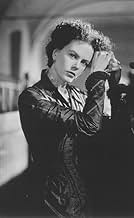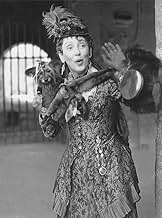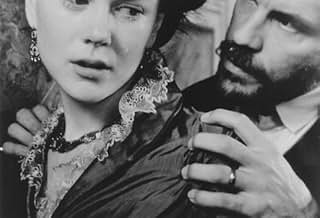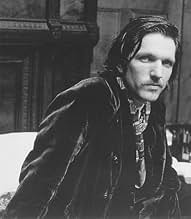NOTE IMDb
6,2/10
13 k
MA NOTE
Une jeune fille américaine hérite d'une fortune. Elle tombe dans une relation malavisée avec un artiste de confiance gentleman, dont la vraie nature acérée et avide transforme sa vie en cauc... Tout lireUne jeune fille américaine hérite d'une fortune. Elle tombe dans une relation malavisée avec un artiste de confiance gentleman, dont la vraie nature acérée et avide transforme sa vie en cauchemar.Une jeune fille américaine hérite d'une fortune. Elle tombe dans une relation malavisée avec un artiste de confiance gentleman, dont la vraie nature acérée et avide transforme sa vie en cauchemar.
- Réalisation
- Scénario
- Casting principal
- Nommé pour 2 Oscars
- 5 victoires et 15 nominations au total
Amy Lindsay
- Miss Molyneux #1
- (as Katie Campbell)
Avis à la une
When I read DAISY MILLER in high school and was completely unengaged, that set me off the wrong foot with Henry James. I also dislike his over-attentiveness to detail, and I must confess a prejudice against any writer who says in 10 pages what they could just have easily said in 2. Yet THE PORTRAIT OF A LADY, once you get into it, turns out to be quite a powerful novel, and given how much I loved THE PIANO, I was really looking forward to what Jane Campion could bring to it. Rarely have I seen a movie version, though, which is so far off the mark but still has worthy parts to it.
Let's start with the mistakes. Campion claimed she was re-imagining the story of Isabel Archer, an American woman of character but not of means, who eventually marries unhappily, instead of just giving a straight filmed version. That's all well and good, but what she and writer Laura Jones do is all but gut the motivations behind the story; we don't see Archer's vitality early on, so we have nowhere to go when she falls, and we don't see what draws people to her. And when Madame Merle and Osmond appear, they are so obviously snakes in the grass that we think Archer is a fool for trusting them, instead of feeling empathy for her. It doesn't help that Malkovich is so obviously bored here he does nothing to exude any charm. Hershey comes off better, but what's done with her character is a little strange as well.
Nevertheless, this movie can't be easily dismissed. First of all, Campion's gift for imagery still comes through; she visually expresses the passions lying hidden in the novel, which few directors do when adapting period pieces. Also, Kidman grows more confident as the movie wears on, so we do get a sense of Isabel. But as someone already commented, the most worthy element here is Martin Donovan as Ralph, Isabel's sickly cousin in love with her, and whose advice sets the whole story in motion. He doesn't play for sentiment, but earns it instead. The ending also keeps its power. Still, this is quite a missed opportunity for Campion.
Let's start with the mistakes. Campion claimed she was re-imagining the story of Isabel Archer, an American woman of character but not of means, who eventually marries unhappily, instead of just giving a straight filmed version. That's all well and good, but what she and writer Laura Jones do is all but gut the motivations behind the story; we don't see Archer's vitality early on, so we have nowhere to go when she falls, and we don't see what draws people to her. And when Madame Merle and Osmond appear, they are so obviously snakes in the grass that we think Archer is a fool for trusting them, instead of feeling empathy for her. It doesn't help that Malkovich is so obviously bored here he does nothing to exude any charm. Hershey comes off better, but what's done with her character is a little strange as well.
Nevertheless, this movie can't be easily dismissed. First of all, Campion's gift for imagery still comes through; she visually expresses the passions lying hidden in the novel, which few directors do when adapting period pieces. Also, Kidman grows more confident as the movie wears on, so we do get a sense of Isabel. But as someone already commented, the most worthy element here is Martin Donovan as Ralph, Isabel's sickly cousin in love with her, and whose advice sets the whole story in motion. He doesn't play for sentiment, but earns it instead. The ending also keeps its power. Still, this is quite a missed opportunity for Campion.
Henry James's "The Portrait of a Lady" stands as one of the greatest psychodramas in literature, a precise and coolheaded dissection of the evolution of a privileged, idealistic if slightly arrogant young woman. This work exemplifies so many qualities which distinguish his view of human nature; he is compassionate, empathetic and observant yet unyielding in exposing the follies, bad judgement and darkness inherent is his characters. No one, especially Isabel Archer, is let off the hook for their misguided choices and her fate is tragic yet completely plausible and, as laid out by James, completely compelling.
A lost opportunity is the best way to describe the film. It is interestingly photographed, full of greys, blues and whites and suggests an almost funereal solemnity in its production design and cinematography. And Nicole Kidman makes a perfect, iridescent Isabel Archer; she looks the part in every respect and certainly conveys the character's intelligence and poignant receptivity to the sights and people around her.
Would that the film had served her better; Jane Campion and the scriptwriter, Laura Jones, eviscerate James's novel but retaining the basic story and structure but put it through the meatgrinder of 90s feminist revisionism. It has been transmogrified into a simplistic tract of victimization and domestic violence, but in doing so Campion and Jones haven't managed to at least raise the story's entertainment value or even create a coherent narrative line for the audience to follow. Rather than present Isabel as a poignant, charismatic figure who unwittingly corrupts her life through bad choices and misguided idealism, the writer and director show us a woman who is victimized by a big bad Man who keeps her locked up in the house, abuses her and steals her money upon duping her into an unhappy marriage. In doing so, James's great work has been drained of its universality and dramatic impact. And while sexual exploitation and gender roles certainly play a part in sealing Isabel's fate in 19th century society, by ignoring the trenchant thematic notions of self determination and the risks of emotional idealism presented by James in his book, we are given a shallow, one-dimensional creation lacking in James's acid edge. Campion cheats a modern audience of discovering filmically a great and still-relevant work by a writer who dared to travel down the darker alleys of a more "civilized" age.
A lost opportunity is the best way to describe the film. It is interestingly photographed, full of greys, blues and whites and suggests an almost funereal solemnity in its production design and cinematography. And Nicole Kidman makes a perfect, iridescent Isabel Archer; she looks the part in every respect and certainly conveys the character's intelligence and poignant receptivity to the sights and people around her.
Would that the film had served her better; Jane Campion and the scriptwriter, Laura Jones, eviscerate James's novel but retaining the basic story and structure but put it through the meatgrinder of 90s feminist revisionism. It has been transmogrified into a simplistic tract of victimization and domestic violence, but in doing so Campion and Jones haven't managed to at least raise the story's entertainment value or even create a coherent narrative line for the audience to follow. Rather than present Isabel as a poignant, charismatic figure who unwittingly corrupts her life through bad choices and misguided idealism, the writer and director show us a woman who is victimized by a big bad Man who keeps her locked up in the house, abuses her and steals her money upon duping her into an unhappy marriage. In doing so, James's great work has been drained of its universality and dramatic impact. And while sexual exploitation and gender roles certainly play a part in sealing Isabel's fate in 19th century society, by ignoring the trenchant thematic notions of self determination and the risks of emotional idealism presented by James in his book, we are given a shallow, one-dimensional creation lacking in James's acid edge. Campion cheats a modern audience of discovering filmically a great and still-relevant work by a writer who dared to travel down the darker alleys of a more "civilized" age.
How can Henry James' novella "Turn Of The Screw" swallow me in whole while I find his other work wordy and arrogant? And how can the same director that has made the two most boring movies I have ever seen, "Two Friends" and this one, also be the same person behind "Sweetie" and "Holy Smoke" - the two finest examples of a movie drawing real characters in real places I have ever seen? This film left me in a state of semi-paralysis.
Being a fan of slow-paced, foreign, and period piece movies, I was pretty surprised at how much this movie bored me. I'm writing this review to try to sort out my feelings of bewilderment.
I think one problem is the use of John Malkovich. We've seen him soar to great heights in the paradoxical "Being John Malkovich" and "The Glass Menagerie", but here his monotone is overly droll and predictable, almost as if he is playing off himself in a Saturday Night Live sketch. In fact the most enjoyable part of this movie was the scene where Mr. Malkovich twirls the umbrella in an ambiguously literal attempt to hypnotize Isabel. If only there were more of these elements in the film....
Then there's Nicole Kidman, whose underachieving attempts at acting has managed to ruin films by not one but two of the greats: Ms. Campion and Stanley Kubrick. Her delivery was similar to Gwyneth Paltrow's in "Mr. Ripley" -- obviously lost. She's just another pretty face thrown into a role of substance after receiving excessive amounts of hype. Watching them act gives me the same feeling I get watching the members of Milli Vanilli try to sing. In their element, they can be undeniably sexy or cute, but in deeper roles the viewer is left completely clueless to their characters' motives. Is Isabel supposed to be docile, alluring, witty, in-control, charismatic, or not-in-control? We can't tell.
In this mess, Barbara Hershey and Martin Donovan as the sickly cousin were both very good. But alongside the weak link Kidman there was little they could do. And Campion made some extremely unusual stylistic sidetracks, the very sidetracks that work in the Holy Smoke India scenes. But in a period piece the fading dream suitors, inexplicable intro, and Chaplin filters seemed inappropriate, although one has to admire her for trying. Even when I don't agree with her methods I respect her sense of adventure (but let's face it, I'll love her forever because of Sweetie). With a little more humility from Campion, a different Isabel, and a more invigorated Malkovich this film might have worked.
For a good treatment of James, try to scare up a copy of the 1961 film The Innocents.
Being a fan of slow-paced, foreign, and period piece movies, I was pretty surprised at how much this movie bored me. I'm writing this review to try to sort out my feelings of bewilderment.
I think one problem is the use of John Malkovich. We've seen him soar to great heights in the paradoxical "Being John Malkovich" and "The Glass Menagerie", but here his monotone is overly droll and predictable, almost as if he is playing off himself in a Saturday Night Live sketch. In fact the most enjoyable part of this movie was the scene where Mr. Malkovich twirls the umbrella in an ambiguously literal attempt to hypnotize Isabel. If only there were more of these elements in the film....
Then there's Nicole Kidman, whose underachieving attempts at acting has managed to ruin films by not one but two of the greats: Ms. Campion and Stanley Kubrick. Her delivery was similar to Gwyneth Paltrow's in "Mr. Ripley" -- obviously lost. She's just another pretty face thrown into a role of substance after receiving excessive amounts of hype. Watching them act gives me the same feeling I get watching the members of Milli Vanilli try to sing. In their element, they can be undeniably sexy or cute, but in deeper roles the viewer is left completely clueless to their characters' motives. Is Isabel supposed to be docile, alluring, witty, in-control, charismatic, or not-in-control? We can't tell.
In this mess, Barbara Hershey and Martin Donovan as the sickly cousin were both very good. But alongside the weak link Kidman there was little they could do. And Campion made some extremely unusual stylistic sidetracks, the very sidetracks that work in the Holy Smoke India scenes. But in a period piece the fading dream suitors, inexplicable intro, and Chaplin filters seemed inappropriate, although one has to admire her for trying. Even when I don't agree with her methods I respect her sense of adventure (but let's face it, I'll love her forever because of Sweetie). With a little more humility from Campion, a different Isabel, and a more invigorated Malkovich this film might have worked.
For a good treatment of James, try to scare up a copy of the 1961 film The Innocents.
I have always enjoyed period pieces, good adaptations even more so. This film, however, is really only worth a 5 - an average film - if not for the strong performances of the supporting cast. The work of Barbara Hershey and Martin Donovan in particular is stellar, raising my rating to 6 on their merit alone.
Aside from those two, this film is an exercise in 'almosts' and 'not quites'. It is almost engaging enough, yet just short of drawing me completely in. It not quite makes me believe Nicole Kidman's Isabel is worthy of the love of so many. The love shown by the suitors is believable enough (again, a well acted supporting cast), I simply do not quite believe the object of that love would elicit it.
Still, the film is good. It is a pity, though. It could have been great.
Aside from those two, this film is an exercise in 'almosts' and 'not quites'. It is almost engaging enough, yet just short of drawing me completely in. It not quite makes me believe Nicole Kidman's Isabel is worthy of the love of so many. The love shown by the suitors is believable enough (again, a well acted supporting cast), I simply do not quite believe the object of that love would elicit it.
Still, the film is good. It is a pity, though. It could have been great.
Many people could not warm up to this remarkable adaptation of Henry James' novel, A Portrait of a Lady. The dark, abusive themes and open ending are not part of typical costume drama fare, but both are true to Henry James' novel and to Jane Campion's vision.
Henry James originally wrote the novel in the 1880s. Intended as an exploration of what a woman might do if she were given independent means, James' book indicts women as being trapped by a weaker nature. Exploring the same material Campion's movie comes to a different conclusion.
The adaptation and direction are superb. The movie maintains the steady rhythm of doom that makes James' novel an enduring classic. There is no place where this is more evident in the film than in its lingering images. The camera holds on to the subject a moment longer than expected, making the viewer a little uncomfortable, and anticipating sudden disaster that never quite arrives. Ms. Campion directs this film like a horror film, which is exactly what it is.
The acting in this film is also convincing, from Nicole Kidman's paralyzed Isabel, to John Malkovich as a hypnotically terrifying pursuer. They are backed by a solid cast of major actors in minor roles, all adding to Isabel's complex societal tragedy.
Portrait of a Lady, particularly this film adaptation, is a remarkable example of how stories may stay the same, but their meanings change over time.
Related films include: Washington Square (1997), The House of Mirth (2000), The Buccaneers (1995)(mini).
Henry James originally wrote the novel in the 1880s. Intended as an exploration of what a woman might do if she were given independent means, James' book indicts women as being trapped by a weaker nature. Exploring the same material Campion's movie comes to a different conclusion.
The adaptation and direction are superb. The movie maintains the steady rhythm of doom that makes James' novel an enduring classic. There is no place where this is more evident in the film than in its lingering images. The camera holds on to the subject a moment longer than expected, making the viewer a little uncomfortable, and anticipating sudden disaster that never quite arrives. Ms. Campion directs this film like a horror film, which is exactly what it is.
The acting in this film is also convincing, from Nicole Kidman's paralyzed Isabel, to John Malkovich as a hypnotically terrifying pursuer. They are backed by a solid cast of major actors in minor roles, all adding to Isabel's complex societal tragedy.
Portrait of a Lady, particularly this film adaptation, is a remarkable example of how stories may stay the same, but their meanings change over time.
Related films include: Washington Square (1997), The House of Mirth (2000), The Buccaneers (1995)(mini).
Le saviez-vous
- AnecdotesFirst collaboration between director Dame Jane Campion and Nicole Kidman. However, it was Campion who discovered Kidman, where she, at the age of fourteen, was performing at Australian Theater for Young People and subsequently caught the eye of Campion.
- Gaffes(at around 47 mins) A horse carriage is passing through the shot from right to left. The crew with dolly-cam and equipment is clearly visible.
- Citations
Ralph Touchett: I love you but without hope.
- Crédits fousJane Campion thanks her family, Colin, Alice and Richard, for their generous support, suggestions and encouragement during the making of this film.
- Bandes originalesImpromptu in A Flat Major, Op 90 No. 4, D899
(1828)
Composed by Franz Schubert
Adapted for screen by Brian Lock
Performed by Jean-Yves Thibaudet (as Jean Yves Thibaudet)
Courtesy of Decca Records Company Ltd.
Meilleurs choix
Connectez-vous pour évaluer et suivre la liste de favoris afin de recevoir des recommandations personnalisées
- How long is The Portrait of a Lady?Alimenté par Alexa
Détails
- Date de sortie
- Pays d’origine
- Langues
- Aussi connu sous le nom de
- The Portrait of a Lady
- Lieux de tournage
- Palazzo Pfanner, Lucca, Tuscany, Italie(Osmond's palace in Florence)
- Sociétés de production
- Voir plus de crédits d'entreprise sur IMDbPro
Box-office
- Montant brut aux États-Unis et au Canada
- 3 692 836 $US
- Week-end de sortie aux États-Unis et au Canada
- 107 819 $US
- 29 déc. 1996
- Montant brut mondial
- 3 692 836 $US
- Durée
- 2h 24min(144 min)
- Couleur
- Mixage
- Rapport de forme
- 2.35 : 1
Contribuer à cette page
Suggérer une modification ou ajouter du contenu manquant




































